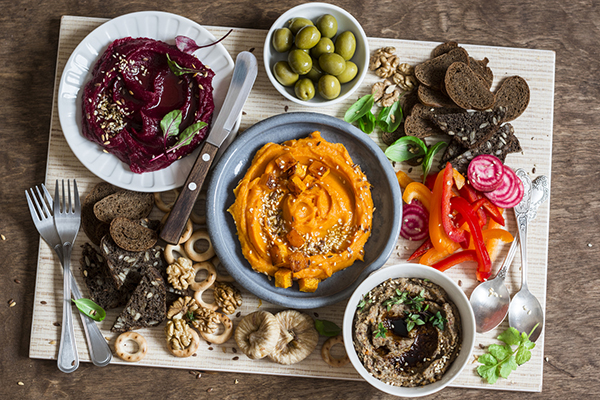
According to the U.S. News & World Report Best Diet Rankings of 2019, the Mediterranean diet is #1 overall.
One minute, the villain is fat, then it’s carbs, then sugar, and so on. Fad diets and food trends come and go, but the merits of a few diets have stood the test of time (and trends), and Mediterranean diet is one of those diets.

This eating plan hails from the area surrounding the Mediterranean Sea, and provides a window into how the people of this region ate in the late 1950s and 1960s, a difficult economic time for the area. Because of financial restraints, the traditional diet didn’t include much meat and centered on vegetables, fruits, beans, legumes, nuts, whole grains, olive oil, herbs, and spices.
“I’m a fan of the Mediterranean diet because it’s focused on whole foods it doesn’t allow for a lot of processed foods – and it incorporates a lot of healthy fishes, which means you’re getting healthy fats, says Paige Benté M.S., R.D., C.S.S.D. and Beachbody nutrition manager. “It [the diet] promotes a lot of fruits and vegetables and then other healthy fats from things like nuts and avocado. And I’m a fan of diets that allow for small servings of wine and dark chocolate,†she adds.
Today, a Mediterranean diet pyramid exists, and much like the old USDA pyramid (now MyPlate), it continues to evolve as the body of science around nutrition and food grows.
Unlike the USDA MyPlate, the current Mediterranean pyramid places heavy importance on social and culture elements that are key characteristics of the Mediterranean way of life.
Health Benefits of the Mediterranean Diet
The Mediterranean diet is considered to be one of the healthiest in the world. A significant body of research shows it can reduce the risk of cardiovascular disease, and other research suggests that it can help you lose weight, maintain a healthy blood sugar, cholesterol, and blood pressure levels.
Mediterranean Diet Pyramid Food List
The Mediterranean Diet Pyramid is organized by food and frequency: foods that you should eat at every meal, every day, weekly, and in moderation.

Foods to Eat at Every Meal
These foods, found at the base of the pyramid, are encouraged to be enjoyed every meal, every day, while balancing overall energy intake.
Grains: One to two servings per meal. Examples include bread, rice, pasta, millet, couscous, etc. Whole grains are recommended over refined grains.
Fruits: One or two servings at all three meals is recommended and fruit should be chosen as the dessert the majority of the time. Examples include grapes, watermelon, apples and oranges.
Vegetables: Vegetables at lunch and dinner, with a minimum of two servings per meal. The guidelines also stipulate that at least one of the servings should be raw, and to aim for a variety of textures and colors to provide a range of antioxidants and other nutrients.
Olive Oil: This is what many people think of when they think of the Mediterranean Diet and for good reason. Olive oil is at the center of the diet and is recommended as the main source of fat; it contains vitamins K and E, as well as healthy monounsaturated fatty acids (MUFAS).

Foods to Eat Every Day
Dairy: The Mediterranean Diet recommends two servings of low-fat dairy, typically in the form of low-fat yogurt and cheese.
Spices, Herbs, Garlic, and Onion
Olives, Nuts, Seeds: One to two servings per day. Walnuts, pistachios, chia seeds, and olives are all examples of this group.
Foods to Eat Weekly
Fish, Seafood, White Meat: Two servings of white meat and a minimum of two servings of fish and seafood per week is recommended.
Eggs: Two to four servings per week.
Legumes: It’s recommended that you enjoy more than two servings of legumes each week, preferably with grains so that you’re getting a complete protein source.
Red Meat: Less processed, lean red meats. Less than two servings per week recommended.
Foods to Eat Occasionally
Wine and Other Fermented Beverages: Suggested amounts one glass of wine per day for women, and for men, two glass per day.
Treats: Cake, cookies, candy, and other treats aren’t banned; just make sure to enjoy them very infrequently.
Mediterranean Lifestyle and Culture
In addition to healthy foods, lifestyle and cultural elements are also part of the pyramid, specifically: activity, rest, socialization, cooking, seasonality, and moderation. These form the foundation of the diet’s pyramid.
Activity and Rest: The Mediterranean lifestyle stresses being active outside; at least 30 minutes a day of moderate physical activity to help support a healthy weight, as well as the necessary rest to recover.
Socialization and Cooking: It’s believed that cooking with family and friends, and enjoying a friendly, lively meal with others adds social and cultural value by creating a sense of community.
Seasonality: The foods list emphasizes fresh, seasonal, whole foods to support and preserve the local environment.
Moderation: Eating food in healthy portion sizes.
Sample Mediterranean Diet Plan on 21-Day Fix
(Beachbody’s Paige Benté M.S., R.D., C.S.S.D. created this one-day, 1,500 – 1,799 calorie Mediterranean Diet Plan based on the Fix Program.)
Breakfast: Scrambled Eggs and Raspberry Oatmeal
Raspberries (1 Purple)
Scrambled eggs (1 Red)
Oatmeal, cooked (1 Yellow)
2 Tsps olive oil
Snack: apple (1 Purple) + 8 walnut halves (1 Blue)
Lunch: Greek Lentil Salad
Leafy greens (1 Green)
Chopped tomato, cucumbers, and onions (1 Green)
Chicken breast, grilled (1 Red)
Lentils, cooked (1 Yellow)
Balsamic dressing (1 Orange)
Snack: Blueberries (1 Purple) + 2% plain Greek yogurt, unsweetened (1 Red)
Dinner: Salmon and Rice with Sautéed Vegetables
Summer squash (1 Green)
Broccoli (1 Green)
Salmon, grilled (1 Red)
Brown rice (1 Yellow)
2 Tsps olive oil
Losing Weight on the Mediterranean Diet
It may seem counter-intuitive to previous ways of thinking (remember villain-izing specific nutrients?) but this diet which includes high-fat foods like olive oil, avocados, and sometimes cheese has been shown to help with weight loss, when coupled with regular exercise.
In a prominent study looking into the benefits of the Mediterranean Diet, subjects were assigned to one of three diets: a Mediterranean Diet supplemented with olive oil; a Mediterranean Diet supplemented with nuts; or a control diet. The study found that subjects on the two versions of the Mediterranean Diet added the fewest inches to their waistlines, and the olive oil folks lost the most weight.
The Bottom Line
One of the keys to successfully losing weight and keeping it off is to find a pattern of eating that is satisfying and fits in with your lifestyle.
From the Beachbody On Demand Blog – August 23, 2017 | BY: Kelly Plowe, M.S., R.D.
Do you want to lose weight, build muscle, or feel more fit? Join Beachbody On Demand, and get access to Beachbody’s world-famous programs, including 21 Day FIX ®, 80 Day Obsessionâ„¢, and P90X ®. Don’t miss out on your chance for amazing results.



